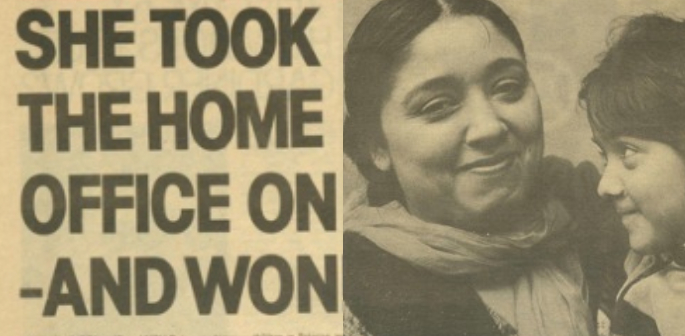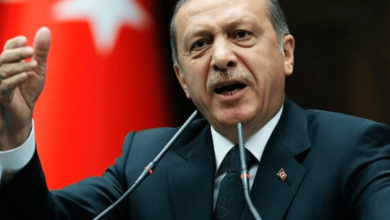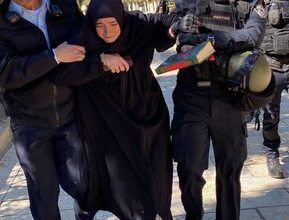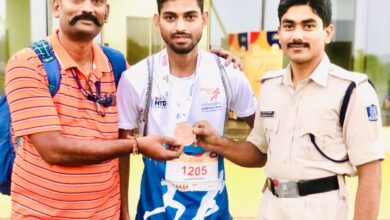Anwar Ditta: The mother who took on the UK government and won
It is 40 years since Anwar Ditta won her campaign against the UK Home Office and became one of the first to use DNA evidence to win the right to family reunification.

A photograph from 1982 shows the legendary late Labour MP, Tony Benn, marching in Trafalgar Square alongside the Namibian revolutionary, Sam Nujoma, the South African freedom fighter Oliver Tambo and a sea of male trade unionists holding banners denouncing apartheid and offering solidarity to the people of Namibia and South Africa. In the middle of this image stands a striking, yet petite lady: Anwar Ditta.
Today, Anwar, 67, is an unassuming housewife of Pakistani heritage who resides in Rochdale, Greater Manchester. But, between 1975 and 1982, she found herself at the centre of an anti-racist movement because of her fearless fight against Britain’s Home Office which had separated her from her three children in Pakistan.
Anwar’s story came to define an era of Asian anti-racist resistance, due to the explicit institutional racism it exposed within the British government. Her fight against the country’s racist immigration laws was by no means unprecedented. But what separated Anwar’s case from the many others like it was the rainbow coalition of support she managed to garner and her ability to mobilise people both nationally and internationally in her defence.
Her experience exposes Britain’s deeply shameful history of racism and the traumatic consequences many faced as a result of its prejudicial institutions.
Born in Birmingham, the UK’s second-largest city, in 1953, Anwar’s early years were mainly spent in Rochdale, where she lived with her younger sister, Hamida, and her parents.
Anwar’s mother, Bilquis Begum, and her father, Allah Ditta, were from Pakistan, born there while the nation was under British colonial rule. Spurred by curiosity, her father, who was born in 1921, left his teaching job in Pakistan and moved to the UK in the 1950s. When he arrived, he was employed as a bus conductor and foreman in a crystal factory while his wife, who moved to Britain a few years later, stayed at home with their children.
Then in 1963, Anwar’s parents separated and her father won custody of Anwar and her sister. They were sent to live with their paternal grandparents in Pakistan. Today, Anwar says she has few recollections of this time. She does know that, on arrival, they were enrolled in a local school. But her grandfather, fearing that they would leave the family home and the country if they were educated, objected and they were pulled out of school when Anwar was 9 and Hamida 7.
‘Treated worse than somebody accused of murder’
In 1967, when she was 14 years old, Anwar was married under Islamic law to 22-year-old Shuja Ud Din. His family had been renting a property from Anwar’s grandfather and the two families had become well acquainted by the time Anwar’s grandmother arranged the marriage. The couple had three children – Imran, Kamran and Saima.
Anwar had only very sporadic contact with her mother during her childhood. But, when her mother visited Pakistan in 1975, Anwar expressed her wish to travel back to Britain, her birth country. She also wanted to join Shuja who had been sponsored by a friend to live in Denmark before he moved on to the UK in 1974 where he lived with Anwar’s mother while he waited for her to arrive. Unaware of her legal rights as a British-born citizen to travel back to the UK with her children, Anwar and Shuja agreed to re-marry under British law, find a new home there and settle before applying for their children to join them.
In 1976, by which time they had a fourth child – a British-born daughter called Samera – Anwar and Shuja applied for their three children in Pakistan – now aged 6, 4 and 3 – to come to Britain.
That, she recalls, was when her “nightmare with [the] immigration authorities began”.
The Home Office made them wait two and a half years for the result of their application. In that time, Anwar and Shuja met with countless solicitors, organised pickets and even sought the help of the recently established Commission for Racial Equality (CRE).
Anwar describes how emotionally shattering this time was as “the children [in Pakistan] were very small. My youngest child was breastfeeding when I left.
In May 1979, the Home Office refused their application because, it said, it doubted the parental relationship the couple had with their children. In its decision, the Home Office stated that the evidence the couple had provided was insubstantial and falsely stated that “no documents or evidence to show positively that she bore three children in Pakistan had been produced.”
The Home Office began to suggest that Anwar’s sister-in-law, Jamila, who lived in Pakistan, was the true birth mother of the three children.
Officials also argued that there was no evidence to prove that Anwar had ever lived outside of the UK and, therefore, no way to prove the couple had married in Pakistan. Instead, the Home Office suggested that documents showing Anwar and Shuja marrying in Pakistan belonged to a different couple entirely who happened to share the same names as them.
One problem was that Anwar’s family had falsified her age on her marriage certificate to enable the marriage to proceed – it stated that she was 20 (the age of consent) at the time rather than 14.
In response to these claims, the couple sent the birth certificates of Jamila’s own six children along with photographs of them and Anwar’s three children standing together. To prove that she had, in fact, lived in Pakistan, Anwar provided officials with further photographic evidence of her, Shuja and their children in the country. There was also evidence in her British health records which showed no medical files from 1962, when she left Britain as a 9-year-old, until 1975, when she re-entered aged 22 and re-registered with the National Health Service.
Anwar even underwent invasive internal examinations to provide evidence that she had given birth to her children. This “virginity testing” practice was used by the Home Office on many Asian women in the 1970s to allegedly assess their “true” marital status and decide the outcome of their immigration applications. Anwar compares the trauma of this practice to being “abused by consent”.
None of the evidence could sway the Home Office, however.




